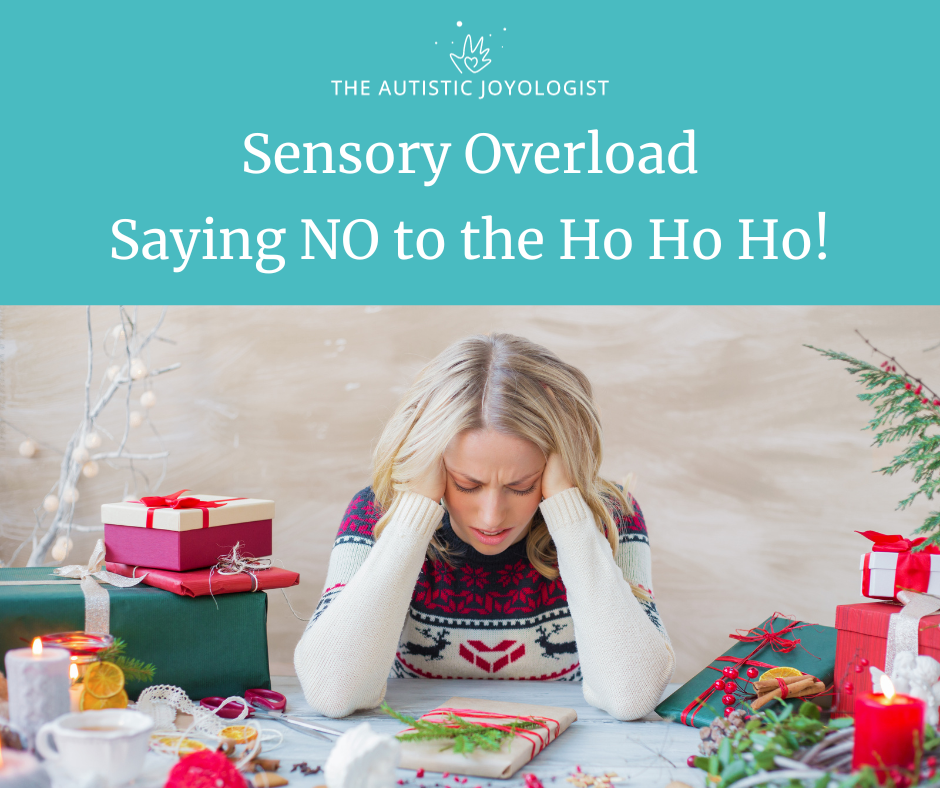Sensory overload can be stressful over the festive period. With the pressure to have fun, socialise and be surrounded by others.
Getting through the festive season when you’re autistic, and ADHD can feel like an assault on all of your senses at once. Stepping away from your usual routine brings additional challenges, too. After my diagnosis in my mid-forties, I reflected on Christmas’ gone by and the many struggles I had experienced. I felt like I was supposed to love this time of year, with my birthday just a few days before Christmas. The truth is, I always secretly dreaded it, knowing I would have to face work parties, crowds of prosecco-fuelled partying, and the pressure to have fun – the sensory overload was very real!
As a kid, I remember being so consumed with the excitement I wouldn’t sleep the night before. I remember shaking in my bed with anticipation that Mr Claus would visit while I was supposed to be asleep. I barely slept and, and until my late thirties, would still stay at my parents’ house on Christmas Eve, getting up in the night to open my stocking at 3 am, carefully peeling off the paper to not wake anyone up. I loved the excitement and the process of opening things quietly, alone in the darkness and silence – it was a massive dopamine hit.
Christmas Day itself didn’t bring the same level of joy. It was busy, noisy, and filled with things that took me outside my regular routine, I could feel the sensory overload building up from early morning, worsening as the day went on. I was not too fond of Christmas dinner due to having sensitivities with food textures and temperatures, and I found the whole day stressful. I always asked for new pyjamas for Christmas, and come 5 pm I was usually ready for bed, exhausted and tearful.
Christmas ramped up when my nieces came along. While seeing them caught up in the magic of it all was beautiful, being in such a noisy and stressful environment brought new challenges, and the sensory overload came quicker. Each rip of the wrapping paper rang in my ears, and there were squeals and yelling as my nieces yelped in delight and squabbled over the colour gifts they had received. After an hour, I had a headache and desperately needed to get somewhere quiet. I needed to decompress.
Even before my diagnosis, I knew the answer was to remove myself from the situation for a while. I’d walk the mile and a half home to feed my cat, giving me a few hours in the fresh air and quiet before returning to the mayhem.

Top tips for managing sensory overload
Since my diagnosis, I’ve found ways to manage the festive season more effectively so I don’t feel so overwhelmed or anxious. Here are my top seven tips for managing sensory overload over the holidays.
- My Loops are my saviour! My tiny earbuds controlling the noise level I am exposed to are my best friend. I love the Loop Switch, because I can switch between total silence and ambient sound, or conversational. Being able to manage my sensory exposure to sound is so helpful.
- I take time away from the noise if I need to. Going for a walk or finding a quiet room helps me decompress and reduce my stress.
- I only attend the festive events I want to attend. I no longer feel obliged to go to everything. Choose the events you say yes to carefully, and don’t be afraid to say no if you don’t want to go or feel like it’s too close to another event.
- Create a space to decompress that soothes your sensory overload and helps you feel calm and safe. Mine is my sofa, which is covered in soft throws and weighted blankets, and it’s even better if my cat joins me.
- Give yourself permission to leave events early if you struggle to cope. I have left gatherings and awards celebrations early because I can feel overwhelmed. Honouring your needs by going home might be the best thing you can do for yourself.
- Take some time before and after busy events to relax. I can cope much better if I am well-rested before a busy event. I also make sure to have quiet time in the days following the festivities to decompress and recover.
- Don’t force yourself to do something to keep others happy if you know it will cause you distress or anxiety. You do not need to put everyone else’s needs and wants over your own.
Sensory overload doesn't have to take over

While the festive season can be a source of fun for many, for others, it’s something to be endured. If you have friends and family you’d love to spend time with outside of a noisy setting, plan something more comfortable for you. It can be a great way to avoid sensory overload. I always find being in nature helps me to decompress.
And if you know someone who is autistic and ADHD, ask them what they need over the festive season to feel comfortable and safe. No two people are the same, and while some will feel the same as me, others will thrive in the party season. I know many an ADHD’er that is in their element at this time of year.
Many assumptions are made about the experiences of autistic and ADHD people. Unfortunately, the outdated stereotypes that remain have painted a misleading picture of what being autistic and ADHD ‘look’ like and the experiences we have. It’s time to ditch the checklists, rip the labels off the boxes, accept each individual for who they are, and ensure they feel safe and loved.
It IS acceptable to say NO to the HO HO HO. It’s also OK to say a big fat YES or even a ‘maybe’. Remove the pressure to do what everyone else expects of you, and do what feels good for you.
You've got this!

I have had a lot of conversations with other women about sensory overload in the run-up to Christmas. The pressure to be everything to everyone, and to show up to multiple events is a lot. I’d really encourage you to think about your own needs so that you don’t start the New Year in a state of overwhelm and burnout.
I hope you have found my blog on sensory overload helpful. As I mentioned at the start, I write from a place of being both autistic and ADHD, and these are just my own experiences. We all have unique and lived experiences.
Until next time, stay brilliant, stay bold, and go out and shine your incredible light in the world.
If you haven’t taken my Success & Happiness Quiz yet, click the link. You’ll get your results immediately, with bespoke advice and tips, which are easily actionable. It takes less than 4 minutes and it’s fun!
Until next time, Nikki x
